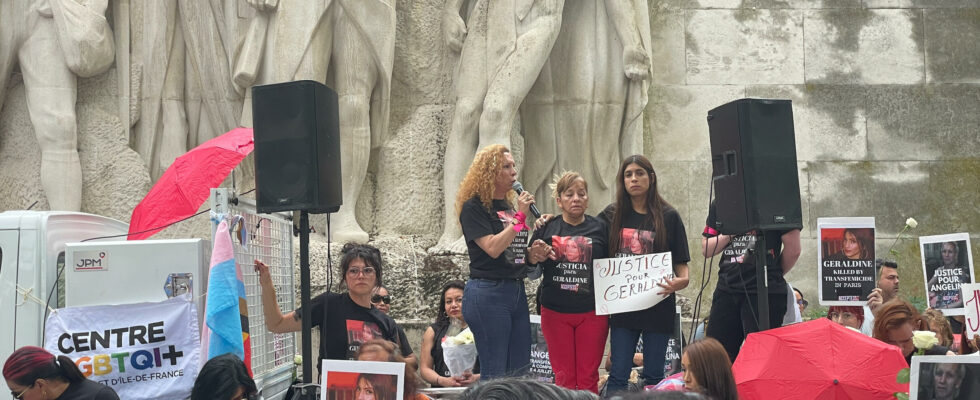Two trans women were killed last week in Paris and Compiègne. These murders reflect a resurgence of violence against these people. Between 2011 and 2023, 14 trans people were killed, according to the only census carried out by LGBT+ community organizations. Associations and NGOs continue to warn of a rise in violence against trans people.
6 mins
“ Justice for Geraldine. “These three words were chanted many times on July 16 on the Human Rights forecourt, Place du Trocadéro, in Paris. At the initiative of Acceptess-T, an association defending the rights of trans people, Prévention action santé travail pour les transgenres (Pastt) and the sex work union (Strass), a mobilization was very quickly organized following the death of Géraldine, 30, on July 9 in the 16th arrondissement of Paris. She was a Peruvian trans sex worker who worked as an escort to help her family financially. “ I will never accept his death ” said her mother Anne, who had arrived from Peru the day before to identify her daughter’s body, in tears.
The Human Rights Parvis, a symbolic place for the gathering, was filled with people of all ages, trans women, sex workers. Many held a white rose in their hands, LGBT+ and transgender flags were flying, next to placards demanding justice, others denouncing: “transphobia kills” or “trans repression = social regression”. Among the organizing associations, representatives of SOS homophobie, Amnesty France, Christophe Martet, president of Towards Paris without AIDS. But also several political figures such as David Belliard, deputy mayor of Paris and the La France insoumise deputies Clémence Guetté and Antoine Léaument, thanked for their presence and immediately questioned: ” You had our support and our votes [pour les élections législatives, NDLR]. Now we are counting on you. The new government must repeal all transphobic laws. »
Indeed, trans people do not feel protected by the French political class, as a representative of the Sex Work Union (Strass) points out: “ Our community is in perpetual mourning. Politicians have taken away everything from us: the right to health care and housing. They are even taking away our right to life. We will fight for the rest of our lives against the evictions, insecurity and acts of hatred that trans women sex workers experience on a daily basis. “The profession is often stigmatized because it is misunderstood, and is governed by a law against prostitution, passed in 2016, which repeals the offense of soliciting, but penalizes clients. Pointed out by associations, it pushes towards a more dangerous practice of the profession.
Uninhibited hatred
For Betty, a 19-year-old trans woman, and her partner Emma, 24, it was important to be present at the gathering: “ This kind of drama unfortunately happens too often in France. And as a trans person or LGBT+we don’t have a lot of rights. “The two women, who live in Seine-et-Marne, are very careful about displays of affection in the street: ” We have already suffered verbal aggression: insults, threats. We don’t feel safe, especially when we come to Paris. It’s not embarrassment or shame, we’re just afraid. »
This resurgence of violence and hate speech has also been noted by human rights associations and non-governmental organizations, such as Amnesty International. It’s been several years sinceAmnesty International warns on a LGBT+ rights decline in the world, despite all the victories won through hard struggle by activists in France “, explains Sébastien Tüller, head of LGBT+ rights issues at Amnesty France. These developments include the adoption of a law against transphobic discrimination in 2012, the “Marriage for All” law introduced by Christiane Taubira in 2013, and the removal of transgender identity as a mental illness from the World Health Organization’s list in 2019.
” In France, we have witnessed a particularly difficult year with an increase in transphobic speeches. We can clearly see that they have a very concrete impact on the lives of the people concerned. ” he continues.
The SOS Homophobia association, founded in 1994, is still observing this yearan increase in referrals, particularly concerning the issue of transphobia. In 2023, 500 cases of transphobia were reported to SOS homophobie. These mainly come from young victims (13%) who are under 18, and more than a quarter are between 18 and 34 years old. While rejection remains the most common manifestation of this transphobia (79%), it does not eclipse insults (28%), discrimination (16%), harassment (13%), threats (11%) and physical attacks (10%).
Hatred fueled by social media and the far right
Even if it remains difficult to have figures that are representative of reality, given the difficulties in filing a complaint, among those recorded, a quarter of cases of transphobia take place on the Internet. Still according to SOS homophobie, the Internet is used as a relay for LGBTphobic messages and an extension of harassment and discrimination experienced in the real world. Social media is an aggravating factor. It is an outlet for everything that can be a manifestation of hatred, of anger that has no limits. “, says Caroline Mecary, a lawyer at the Paris bar, specializing in family law and discrimination.
Every year, June is synonymous with Pride. The LGBT+ community has become even more mobilized in the current context with the rise of the extreme right in recent years and even more recently during the European elections and of the first round of legislative elections. ” It is precisely in times of uncertainty that the rights of minorities are quickly called into question. Hierarchies are always created and the rights of LGBT+ people are never considered the most important.castigates Sébastien Tüller of Amnesty France. Despite the uncertain political context, we still have a President of the Republic in office, we still have a Minister of Equality. And if these people do not speak out, when trans people are killed in France, who will? ? »
Read alsoPeru Pride Month: Decree Describing Trans People as Mentally Ill Sparks Outcry
